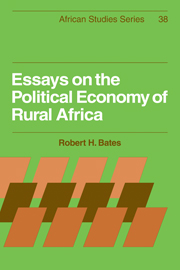Conclusion
Published online by Cambridge University Press: 26 January 2010
Summary
In this volume I have analyzed several of the major themes which have dominated the study of agrarian Africa. I have re-examined one of the oldest of these themes: the sources of order in stateless societies. I have addressed as well a subject long studied by anthropologists and historians: the origins of states in pre-colonial African societies. I have examined the impact of colonial rule upon African rural societies and the response of rural dwellers to the forces unleashed by the colonial order. And I have explored as well a subject of compelling contemporary interest: the nature and origins of post-independence agricultural policy.
The subjects arise naturally in the study of African rural society. In looking at such well-established topics, I have attempted not only to raise new points and to contribute new insights, but also to advance a mode of analysis. By way of concluding, I would like to make explicit the analytic framework which I have employed.
Clearly, the approach I have taken derives from the works of scholars who may loosely be grouped into the collective-choice school of political economy. Three fundamental characteristics of this approach require emphasis and clarification: the premise of rational choice, the method of equilibrium analysis, and the role of institutions.
The collective-choice approach to political economy is characterized by its commitment to the individual as a unit of analysis and to the assumption of rational behavior. Rationality demands that individual decision makers choose their most preferred alternatives. Alternatives will be ranked in terms of their value in enabling the individual to secure his or her preferences; rationality merely requires that the individual choose his or her ‘top’ or most preferred alternative.
- Type
- Chapter
- Information
- Essays on the Political Economy of Rural Africa , pp. 134 - 147Publisher: Cambridge University PressPrint publication year: 1983

